Introduction on Dermatitis
Dermatitis or eczema means skin inflammation. It is not a health condition; rather it is more of a reaction pattern that the skin produces during the course of various diseases. The word dermatitis comes from the Greek ‘derma’ meaning skin and ‘itis’ means inflammation. It is marked by various symptoms like:
- Red and raised blisters
- Severe itchiness
- Rashes
- Skin thickening
- Skin contains fluid, which oozes out if blisters break
- Dry, flaky skin
- Skin that burns and might have sores
- Swelling
- Ulceration
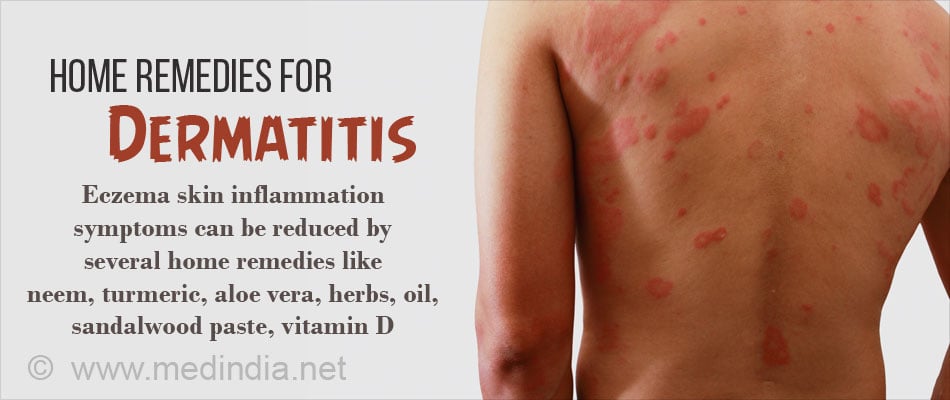
The types of dermatitis are categorized as per location, cause or appearance. The cause of dermatitis is indefinite. However, it depends due to different genetic and environmental factors.
Common Types of Dermatitis
Atopic Dermatitis - It is an allergic reaction and considered hereditary in nature. It is known to run in families where members suffer asthma. It is marked by dry, itchy, red, raised lesions that form in the bends of the arms, legs, and even face, and neck.
Contact Dermatitis- It is further classified into allergic, irritant and photo contact dermatitis. There are hundreds of allergic stimuli like cosmetics, plants, gloves, clothes. Any of the toxic substances like bleaches, battery acid, detergents and others can cause contact dermatitis.
Stasis Dermatitis - It is marked by fluid build-up due to circulation issues, heart disease or varicose veins. Blood cells and fluid leak out of the veins into the skin and other tissues. It is characterized by chronic venous insufficiency.
Nummular Dermatitis or Discoid Eczema - It depends on the appearance of eczema which is coin-shaped oval sores on the skin. It is itchy and could be dry or full of fluid.
Seborrhoeic Dermatitis - It indicates the location of skin inflammation where there is lot of oil-producing sebaceous glands. It may affect face and torso. There are scaly patches and red skin. In infants seborrhoeic dermatitis is referred to cradle cap.
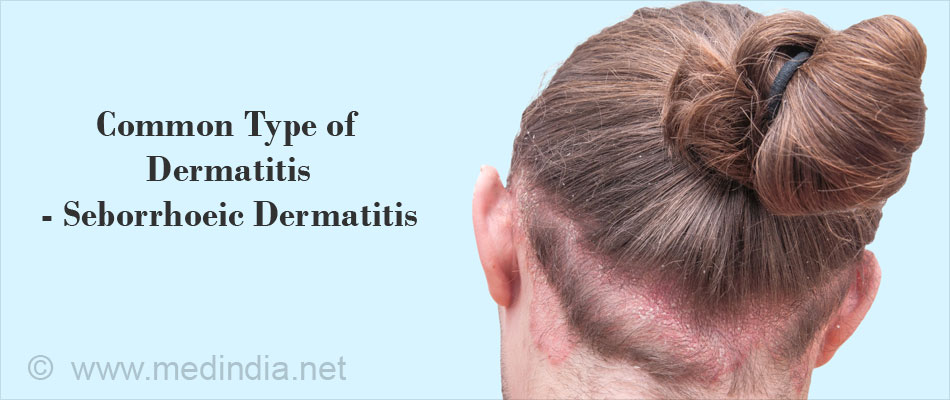
While contact dermatitis can be treated by avoiding the factors that cause it, some types of dermatitis might not have a verified cure. Treatments and home remedies help to control symptoms by alleviating itching and reducing inflammation.
Top Home Remedies for Dermatitis
Drink Adequate Water
Dermatitis is characterized by severe dryness and dehydration. Adequate water intake hydrates the body and flushes the toxins.
Aloe Vera
Aloe vera can be consumed as well as applied topically. Aloe vera has anti-inflammatory and anti-microbial properties. When consumed, aloe vera flushes out toxins. Applying the gel from aloe vera leaf on the dry or burning skin area gives instant soothing effect. Aloe vera gel can be applied several times in a day, for several days till the symptoms are relieved.
Neem
Traditionally neem has been recommended for various skin conditions. Paste of neem leaves or neem oil can be applied to the infected area. Neem has potent anti-bacterial, anti-fungal, anti-viral properties. Neem should be consumed regularly to strengthen the immune system. Alternatively neem leaves can be added to bathing water.
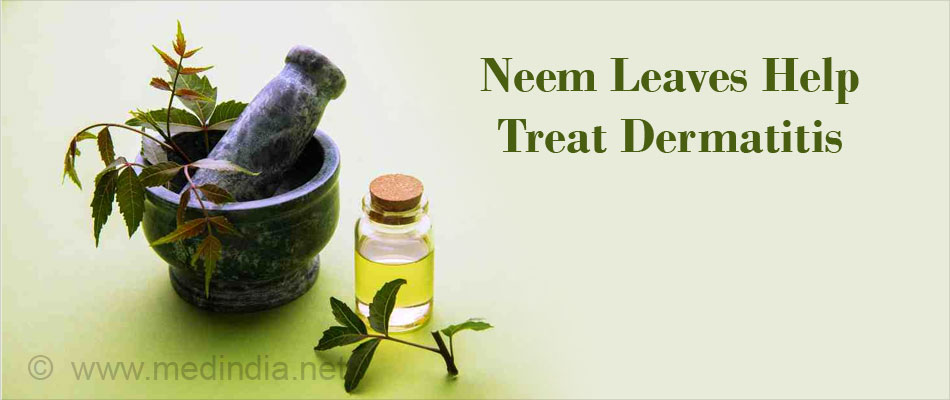
Turmeric
Since ages, turmeric has been recommended for skin conditions for its anti-inflammatory and anti-bacterial properties. Turmeric steeped in boiling water can be consumed for its antioxidant properties. Turmeric paste made with milk or water can be applied to the eczema infected skin.
Honey
Honey has antibacterial and antimicrobial properties which helps to prevent infection. Honey application brings instant relief from dryness as well as burning sensation of the affected skin.
Oatmeal
Oatmeal paste made with cold milk or yogurt helps to alleviate skin inflammation and works as a gentle scrub for scales on the infected skin. The paste is applied, gently massaged and left on the skin for about 30 minutes. 2 cups of oatmeal can be added to bathtub. After soaking yourself in the tub for 20 minutes, pat dry the skin and apply any recommended moisturizer. Natural moisturizer can be made from coconut oil, honey, and aloe vera with basket full of herbs to choose from.
Vitamin D
People with low vitamin D levels are known to suffer more severe skin symptoms. While one can consume dietary Vitamin D in form of salmon, vitamin fortified foods; a practitioner recommended vitamin supplement will also be required to treat eczema. About 18 million Americans of all ages suffer from moderate-to-severe form of eczema. Vitamin D can significantly reduce the severity of atopic dermatitis which is marked by colonization of bacteria Staphylococcus aureus. Body’s immune system produces its own natural antibiotic cathelicidin. Vitamin D helps boost levels of cathelicidin.
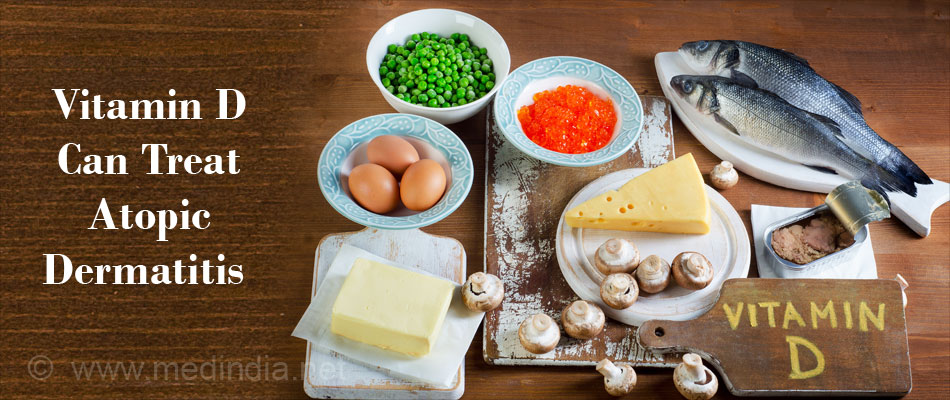
Oil
Olive oil and coconut oil application have given relief to people suffering from dermatitis. Oil application provides hydration as well as calming sensation. Olives and coconut are known for their antibacterial, antimicrobial, antifungal, and antioxidant properties. However, there is a word of caution. In ayurveda, cause of eczema (Vicharchika) has been linked to an imbalance of three doshas pitta, vata, kapha. If the predominant dosha is pitta, then application of olive oil, coconut oil or neem oil can aggravate a burning sensation. The skin rashes can flare up. Consult a specialist to understand the dosha or apply little oil on small portion of infected area to see whether the burning sensation is becoming severe. In such cases aloe vera, honey, neem paste and mucilage based herbs are better options.
Omega Fatty Acids
Consumption of omega fatty acids, like flaxseeds (Alpha-linolenic acid ALA), olives, nuts, seeds and salmon help reduce eczema symptoms. Omega-3 fatty acid docosahexaenoic acid (DHA) and eicosapentaenoic acid (EPA) can improve symptoms of eczema. Fish oil contains both EPA and DHA.
Mucilage Plants
Some plants like English plantain, marshmallow, fenugreek, slippery elm and flax contain mucilages, which act as emollients to soothe the skin. Application of these plant formations help to allay dry and inflamed skin.
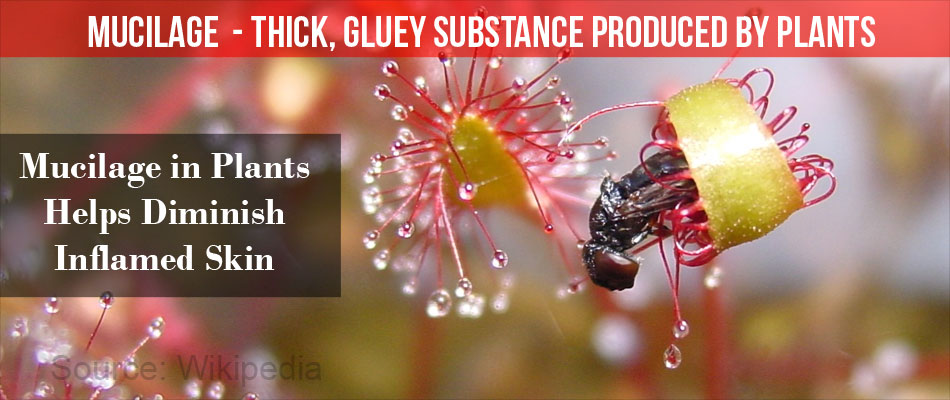
Herbs and Plants
Several herbs and plants have been used since ages to treat eczema or dermatitis. Some plants indicated for eczema treatment are devil's thorn, calendula, hemp seed oil, ashoka flowers, echinaceae, comphrey root, licorice, birch bark, Chinese tree peonies bark, cork tree bark, mentha and Asteraceae rhizome. They differently contain anti-inflammatory, antibacterial, antihistaminic, antifungal, immunosuppressant, and corticosteroid-like effects. Tannins exhibit antimicrobial properties. A few tannin rich plants include, Chinese cinquefoil, Chinese rhubarb, lavender, rhubarb and witch hazel bark. Pansy flower infusion is recommended for seborrheic dermatitis. Oak bark, walnut leaf, flaxseed, fenugreek seed, evening primrose oil, sage leaf, St. John's Wort are known for its anti-inflammatory properties and are used topically.
Other Home Remedies for Eczema
- Cold wet fomentations are also helpful for dermatitis. It alleviates itching and inflammation.
- Papaya seeds paste
- Almond leaves paste
- Sandal wood paste
- Nutmeg powder paste
- Chamomile tea can be consumed for its rich store of flavonoids and anti-inflammation properties
- Epsom salt bath
"In the depth of winter, I finally learned that within me there lay an invincible summer." -Albert Camus.









